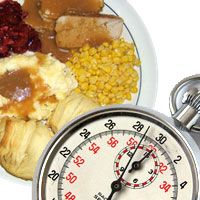Advertisement
November 23, 2006
For decades, dietitians, doctors and nutritionists have made the link between eating speed and weight. People who eat slower tend to eat less and weigh less. The slower you eat, the less food it takes to get you full. The commonly stated reason for this is that the feeling of satiety doesn't really come from your stomach. Like every other feeling you experience, it comes from your brain. It takes time for your body and your brain to complete the communication exchange that finally tells you to stop eating because you're full.
In the last couple of years, science has backed up this common knowledge with experiments that test eating time, amount eaten and the feeling of satiety. The results are consistent: Eating slower means eating less and still feeling "full." A study presented at the North American Association for the Study of Obesity in 2004 had 28 overweight subjects eat a meal at varied eating speeds, always eating as much as they wanted. In one meal, the subjects ate as quickly as they normally would; in another meal, for the first half of the meal they could only take a bit of food when they heard a beep, and for the rest of the meal they could take a bite whenever they wanted; and in the third meal, they had to match bites to beeps for the entire meal (the bites went on indefinitely, so they could still eat as much as they wanted). Invariably, the subjects ate less during the beep-mediated meals than in the free-form meal.
Advertisement
A 2006 study achieved similar results. In this one, 30 women were given big plates of pasta for two different meals. In each meal, they could eat as much as they wanted, but in the first meal, they were told to eat quickly. In the second meal, they were told to eat slowly, chewing each bite of food about 20 times before swallowing. In the fast meal, the women ate an average of 646 calories in nine minutes before they were full. In the second meal, they ate about 579 calories in 29 minutes before they were full. And they reported that they still felt full an hour after the second meal, even though they'd eaten less than during the first meal.
So what's the scientific reasoning behind the results? It's the same as the common-knowledge reasoning. Essentially, people who eat very quickly are overshooting their actual point of satiety. Since the feeling "I am full" comes from the brain, not from the stomach, the amount of food in your stomach is not the only factor involved in the satiety process. It takes time for the body to tell the brain that it has had enough food; and only when the body has sent this signal to the brain can the brain activate the satiety response (which originates in the hypothalamus) that makes us stop eating. Some experts claim it can take up to 20 minutes for the body's signal to reach the brain. So in theory, someone who takes one bite a minute may only overshoot her fullness by 20 bites of food, while someone who takes five bites a minute eats 100 bites more than her body really wants before the satiety signal makes it to the brain.
Twenty minutes seems like a very long time for a signal to reach the brain; but as it turns out, the signal is coming from the intestines, not from the stomach. It takes time for the food we eat to move from the stomach to the intestines, which could explain why it takes so long for our fullness to register with the brain.
For more information on weight-loss techniques and related topics, check out the following links:
Sources
- "Eat Slow, Eat Less." LifeScript. Dec. 28, 2005. http://www.lifescript.com/channels/diet_fitness/diet_tips/eat_slow_eat_less.asp
- Myers, RD and ML McCaleb. "Feeding: satiety signal from intestine triggers brain's noradrenergic mechanism." Science, Vol 209, Issue 4460, 1035-1037. http://www.sciencemag.org/cgi/content/abstract/209/4460/1035
- "Science Confirms Diet Tactic: Eat Slow, Eat Less." LiveScience. Nov. 15, 2006. http://www.livescience.com/humanbiology/061115_eating_slow.html
- Warner, Jennifer. "Eat Slow, Lose Weight?." WebMD. Nov. 17, 2004. http://onhealth.webmd.com/script/main/art.asp?articlekey=55876
Advertisement
